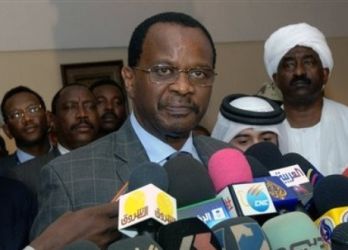Lack of money may collapse peace in Darfur – Sissi
April 24, 2012 (KHARTOUM) — The Chairman of Darfur’s Regional Authority, (RTA) Tijani el-Sissi on Tuesday warned that lack of money might lead to the collapse of the deal his group signed with Khartoum last year.

The bank is a Qatari initiative to assist development and reconstruction efforts in Darfur after the signing of the DDPD. It is supposed to receive all the financial donations and grants dedicated to Darfur development.
The DDB was also supposed to lead a Joint Assessment Mission’s activities to indentify recovery and development projects to be implemented in the largely arid and devastated region.
The leader of the former rebel group, Liberation and Justice Movement (LJM), directed a heavy criticism pointing an accusing finger at the Finance Ministry for failing to pay the $200 million.
“The government has not paid any penny for the bank. We should be more serious if we want peace in the region,” he said “money is a very important start for the bank. And even God put the word money in the Holy Quran.”
He said that the lack of funding led to postponement of two conferences on reconciliation among Darfurians and the voluntary return of the internally displaced people and the refugees.
The Sudanese government is facing an economic crisis since the independence of South Sudan last July, taking over 70% of the country’s oil reserves.
The DRA chief stressed that the countries that pledged to support the peace agreement should pay what they promised to during the negotiations in the Qatari capital Doha.
The international community pledged over $800 million and Qatar said it will pay spend $2 billion on Darfur development projects.
In 2006 the Sudanese government and the Sudan Liberation Movement of Mini Minawi signed a peace deal in the Nigerian capital Abuja, but latter withdrew in 2010.
The now ex-rebel leader Sissi said he will travel on 1 April to Qatar to discuss with officials there how to move the peace agreement forward.
Supported by the international community, the DDPD is seen by many opposition forces as having the potential to bring peace in the region and end the nine-year conflict in Darfur where over 300,000 have people died according to UN estimations.
However, major rebel groups rejected the deal or did not take part in the Doha process. Since November 2011 Darfur’s three main rebel groups established an alliance with the Sudan People’s Liberation Movement – North aiming to topple the government.
The Sudanese legislators, supported Sissi’s call and urged the government to honour its financial commitments in order to facilitate the return of refugees and IDPs and to launch development projects there.
Ismail Hussein, an MP from the Popular Congress Party and head of the opposition caucus in the assembly, told the house he feels pity over the fate of the Doha Document for Peace, calling on Sudanese officials to be more credible.
“If we do not become more honest with such serious issues, this DDPD will face the same fate of the Mini Minawi peace deal, because of lack of trust between the two sides,” Ismail said.
The Darfur Peace Agreement or Abuja deal was signed on 5 May 2006 between the government and a faction of Sudan Liberation Movement led by Minni Minnawi. However, the deal collapsed in 2010 as the parties failed to implement the security arrangements.
Sudan’s justice minister, Mohamed Bushara Dousa told the lawmakers that his ministry had finalised the draft of DDB bill, and filed it to the Council of Ministers which will submit it to Sudan’s parliament.
“The Darfur issue had exhausted the country and brought us a lot of problems,” said the minister who belongs to the troubled region, emphasising that the different institutions involved should work together to fully implement the Doha deal.
(ST)
